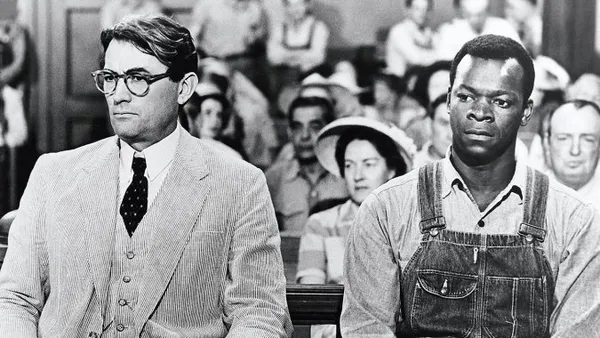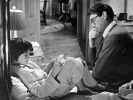Eye For Film >> Movies >> To Kill A Mockingbird (1962) Film Review

Long before Mississippi Burning and A Time To Kill, there was Harper Lee's novel, playwright Horton Foote's adaptation, Robert Mulligan's film and Gregory Peck's Oscar. This little bird sang a sweet song, indeed.
Although Southern based and discriminatory by nature, To Kill A Mockingbird is a woman's memory (voice over narrative) of growing up in a small, nowhere town, where the only mystery was what kind of monster resided at the Radley place and the arrival one summer of Dill Harris (John Megna) to stay with his aunt Stephanie. Dill was older than Scout (Mary Badham) and Jem (Phillip Alford), but smaller, with a big wide city smile and teeth the size of tomb stones.

Scout, Jem and Dill did everything together, sneaking under the fence after dark to snoop through the closed shutters of the Radley front rooms to get a glimpse of Boo (Robert Duvall's first screen role), who was never allowed out because he was crazy maybe and terrible to look at.
When Scout and Jem's father Atticus (Peck) was given the job of defending a negro, called Tom Robinson (Brock Peters), who had been accused of sexually assaulting the teenage daughter of a renowned white trash racist, the kids didn't know how important this would turn out to be for the community and to their lives.
The mood of the film is reflected in Peck's quiet authority. Atticus is a widower with two children and a black maid who acts as a live-out housekeeper and strict disciplinarian. He is the town's lawyer, more accustomed to the writing of wills than facing the collective anger of a lynch mob.
When the trial of Tom Robinson takes place in the cramped courthouse, the three children are watching from the balcony with the coloured people. They may not have understood the significance of what was being said, but would have felt the tension as Atticus calmly picks apart the case for the prosecution.
Before the civil rights movement raged like a bush fire through the South and the true extent of its apartheid was fully recognised, a man like Atticus, with entirely honourable motives, is seen as the lost soul of a once great nation. The film is neither preachy, nor sentimental. It is about tolerance and truth and how the two cannot live together without hope.
In the eyes of children, the world appears fearful, or exciting. "Somehow, it was hotter then," the voice of the older Scout says. She's not talking about politics.
Somehow, it was simpler then. To Kill A Mockingbird is so clear in its judgement and its sense of being. We live, Harper Lee tells us, in the knowledge of our own fallibility.
Reviewed on: 27 Nov 2005

















